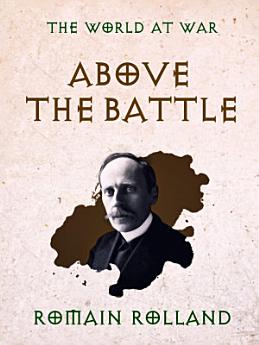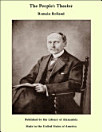Above the Battle
Nov 2018 · Otbebookpublishing
Ebook
123
Pages
family_home
Eligible
info
reportRatings and reviews aren’t verified Learn More
About this ebook
Above the Battle is an anti-world war I treatise by Romain Rolland written in 1916. (Excerpt) "A great nation assailed by war has not only its frontiers to protect: it must also protect its good sense. It must protect itself from the hallucinations, injustices, and follies which the plague lets loose. To each his part: to the armies the protection of the soil of their native land; to the thinkers the defence of its thought. If they subordinate that thought to the passions of their people they may well be useful instruments of passion; but they are in danger of betraying the spirit, which is not the least part of a people's patrimony. One day History will pass judgment on each of the nations at war; she will weigh their measure of errors, lies, and heinous follies. Let us try and make ours light before her!"
About the author
Romain Rolland (1866-1944) was a French dramatist, novelist, essayist, and mystic whose life and work left an indelible mark on 20th-century literature and thought. Born in Clamecy, Nièvre, Rolland was a prodigious student, earning degrees in history and musicology, which later influenced his multifaceted literary career. Rolland is perhaps best known for his monumental 10-volume novel series "Jean-Christophe," which chronicles the life of a German musical genius and explores themes of artistic struggle and the quest for personal and cultural harmony. This work earned him the Nobel Prize in Literature in 1915, solidifying his reputation as a literary giant.A fervent pacifist, Rolland's outspoken opposition to World War I and his advocacy for peace made him a controversial figure. He was often at odds with nationalist sentiments of his time, which led to both admiration and criticism. His correspondence with figures like Mahatma Gandhi and Albert Einstein highlights his commitment to non-violence and intellectual exchange across borders.Rolland's influence extended to contemporary writers and thinkers, including Stefan Zweig and Hermann Hesse, who admired his humanistic ideals and literary prowess. His revolutionary ideas on the interconnectedness of art, politics, and spirituality continue to resonate, offering modern readers a compelling vision of a world where culture serves as a bridge between divided peoples.In an era marked by conflict and division, Romain Rolland's legacy as a champion of peace, cultural dialogue, and artistic integrity remains profoundly relevant, inviting readers to reflect on the enduring power of humanism.
Rate this ebook
Tell us what you think.
Reading information
Smartphones and tablets
Install the Google Play Books app for Android and iPad/iPhone. It syncs automatically with your account and allows you to read online or offline wherever you are.
Laptops and computers
You can listen to audiobooks purchased on Google Play using your computer's web browser.
eReaders and other devices
To read on e-ink devices like Kobo eReaders, you'll need to download a file and transfer it to your device. Follow the detailed Help Center instructions to transfer the files to supported eReaders.







